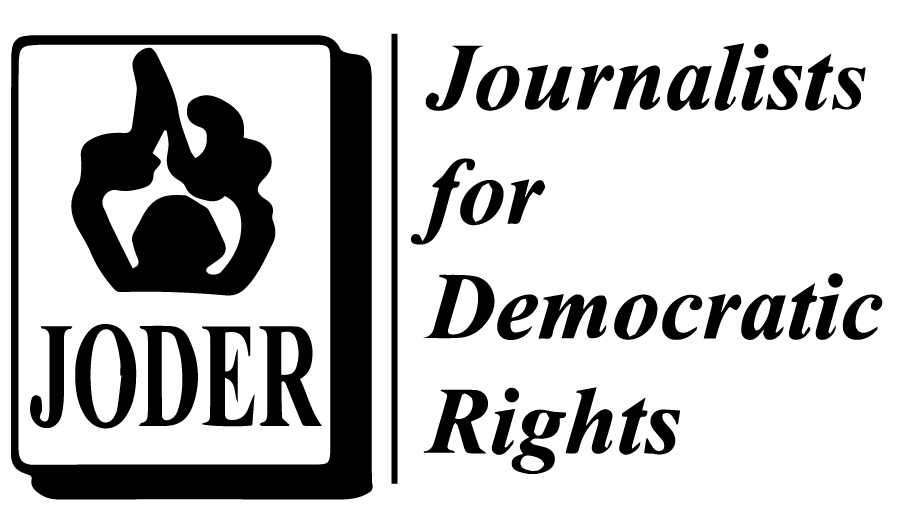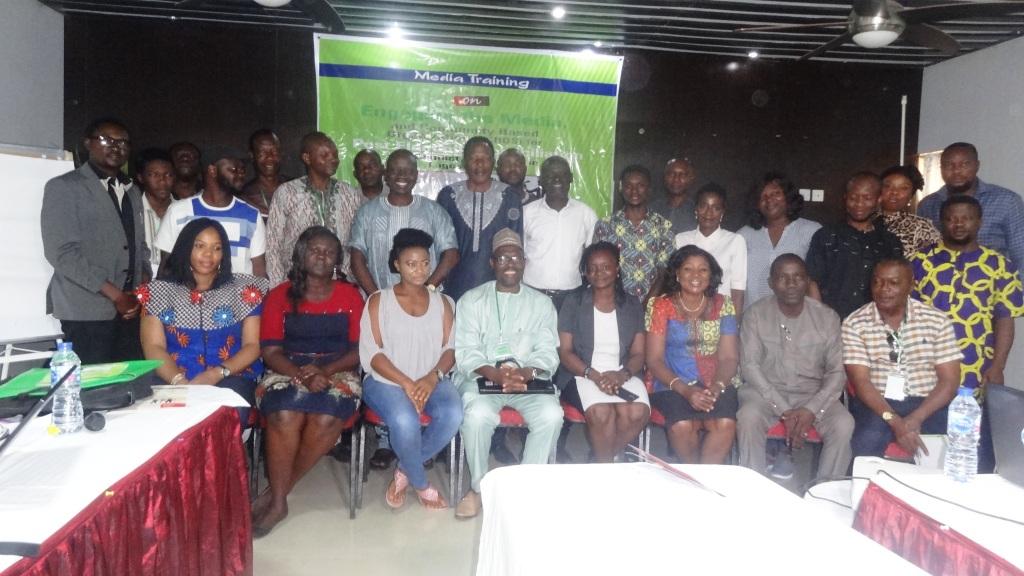Communique issued at the end of the Media Training session on the theme Engaging the Media and Community Based Organisations, (CBOs) for Post Election Reconciliation with Focus on Training of Print, Electronic and Online Media Actors on Reporting for Peace Building and Conflict Prevention organized by the Journalists for Democratic Rights, (JODER) with the support of the Institute of International Education, (IIE) and the Ford Foundation, (West Africa) sub region) held in Lagos on Monday, September 16, 2019
Background
Nigeria is a key player in regional political economy. The country is home to some 180 million people of diverse ethnic and religious configuration. Apart from her strategic importance in Africa, socio-political developments in Nigeria have far reaching consequences in the West African sub-region which is home to some 360million people.
Nigeria returned to democracy after 27 years of military rule. Though the country has gained momentum since the new dawn, many dark areas remain. Some of the major problems facing Nigeria at the moment are the unceasing cases of violent conflict which appear to have become a pattern since the country’s 1960 independence, historically more pronounced after national elections.
Nigeria is also confronted by corruption, poverty, hunger, ethnic divisions, religious intolerance, a new wave of self-determination movements, violent crimes, kidnapping and banditry.
Consequently, there has been an increased rate of violent deaths in Nigeria while threats of greater ethnic or religious conflict now and in the nearest future are real.
Resource persons and Target Audience
The training was attended by 30 media practitioners from the print, electronic and online media including the Chairman of the Nigerian Union of Journalists, (Lagos State) Dr Qasim Akinreti, Chairman, of Guild of Online Publishers, Mr Dotun Oladipo, Director of News, TV continental, Mr Babajide Kolade-Otitoju, representatives of the Nigerian Television Authority, (NTA), the Lagos Television Station, (LTV), and 27 trainees.
Deliberations on the Role of the media
In the past, Nigerians have seen the media contribute to shaping the future of the country and defining public perception of political and economic events.
While making profound contributions to nation building, a section of the media have consistently taken partisan positions and in some instances out rightly fueling intolerance and hate.
The advent of the social media has opened up a new highway of information to different layers of people, providing multiple sources for Nigerians to access information. There have been instances when this advantage has been abused by media users.
The mushrooming of various information outlets has seen the emergence of dedicated propaganda outfits especially in the social media with the potential of broadening the prospect of conflict in Nigeria.
In all of this, the media has a critical role to play in setting agenda for peace and conflict prevention.
Deliberations on the State of the Nation
Whereas, participants know that Nigeria is a potentially great country with her huge human and material resource base;
Whereas Nigeria has a rich and amazing ethnic, cultural and religious diversity that should be a source of strength to Nigeria;
Whereas freedom of expression is one of the major pillars of democracy;
Whereas In Nigeria, the freedom of expression is protected by section 39 (1) of the Federal Republic of Nigeria constitution. The freedom of speech provision in section 39(1) of the constitution provides that―every person shall be entitled to freedom of expression, including freedom to hold opinions and to receive and impart ideas and information without interference’
Conscious of several relevant local and global efforts like the Windhoek Declaration and its statement of press freedom principles by African newspaper journalists in 1991, a declaration produced at a UNESCO seminar, “Promoting an Independent and Pluralistic African Press,” held in Windhoek the capital of Namibia from 29 April to 3 May 1991.
Reaffirming the commitment undertaken in Article 19 of the International Covenant on Civil and Political Rights to protect everyone’s freedom of opinion and expression and to create the conditions for its effective exercise;
Knowing that Nigeria has recently been confronted by multiple crises that has taken violent dimension in many parts of the country to the extent that such has become a source of deep concern to local and international community;
Whereas, Nigeria is facing the challenge of community and national identities which are being expressed in violent and virulent manners;
Whereas the situation in the country calls for a new mass communication consciousness to address the divisions along primordial differences which affect the prospect of sustainable economic and political development;
Realising that the Nigerian media has a long history of positive intervention beginning from 1859 when the first newspaper, Iwe Irohin Yoruba was published;
Whereas, the media has blossomed in recent times with new frontiers and countless outlets for public expression and that while this has added value to public information access, it has also brought in its wake challenges of dealing with deliberate misinformation and propaganda aimed at stifling the country and even promoting hate and malice;
That the new media has also offered the opportunity for people to express themselves and distribute information either raw or processed to the teeming population of Nigerians;
Whereas, the participants admitted the obvious setbacks in the form of sensationalism, stereotyping, ethnic profiling, and outright promotion of propaganda materials by a section of the media.
Whereas the media has a very important role to play in setting agenda of peace and conflict prevention in reporting the various forms of conflict across the country;
Realising that capacity building of media practitioners is crucial to the need for a constructive engagement of critical issues by the media in Nigeria towards developing a national peace and conflict prevention agenda for the country;
Whereas the training exposed the media to real situations in Nigeria, pointing out the strength and weaknesses of the mainstream media and citizenship information outlets;
Participants admitted the need to strengthen the role of the social media in promoting greater awareness, increasing the potential of greater participation in socio-political affairs and also helping the citizens to reach out and defeat the emerging culture of violence;
Participants noted the dangers associated with such a trend and the possibility of such endangering the future of peace building in Nigeria as a whole;
After the one day training and exhaustive deliberations, media practitioners make the following resolutions:
- Media practitioners will work towards the promotion of the utilitarian value of the people of Nigeria by promoting peaceful co-existence and sustainable livelihood.
- The Nigerian Union of Journalists, (NUJ) is encouraged to intensify its campaign for professionalism and ethics in the media which will enhance greater responsibility on the part of media practitioners
- The newsrooms and media organisations through its network will organize periodic training for its members on best practices towards crisis prevention in Nigeria
- Journalists in the mainstream media and online platforms will henceforth ensure greater professionalism which is in the interest of the media profession and the people of Nigeria.
- The State and Federal authorities should ensure greater access to information through honouring of the Freedom of Information Act 2014.
- Government and corporate institutions should see the media as partners and therefore provide necessary information that can help the people and the society at large, and such should be provided promptly too. In this respect participants frown at the recent attacks on citizen media by the Nigerian authorities which has led to the arrest and detention of a couple of media practitioners. Participants call for the immediate release of all journalists currently being detained by the Government or that they should be taken to the law court
- Participants agree to work together to ensure the success of the National Working Group on Peace Building and Conflict Prevention set up by JODER with the support of the Institute of International Education and Ford Foundation, West Africa Regional Office
- Participants agree to reframe from ethnic or religious profiling in their reporting but rather will set agenda for conflict resolution and the avoidance of sentiments, prejudices, hasty generalization, profiling and stigmatization.
- Journalists hereby commit themselves to publishing stories that promote national unity, defend human rights, sustain democracy, peace and conflict prevention.
- Objectivity, balancing of stories and being fair to both sides of the party shall be the guiding principle in reporting social, political and economic issues.
- Participants request for more frequent meetings and training for stakeholders realizing how useful and impactful the one day training had been.
- The participants express full appreciation to Journalists for Democratic Rights, (JODER) and the supporters of the project, the Institute for International Education, (IIE) and the Ford Foundation, (West Africa sub region) for the opportunities offered and the knowledge shared during the training.
SIGNED
Dr Qasim Akinreti
Chairman, Nigerian Union of Journalists, (NUJ)
Mr Dotun Oladipo
Chairman, Guild of Nigerian Online Editors
Adewale Adeoye
Executive Director, JODER



